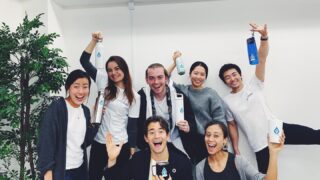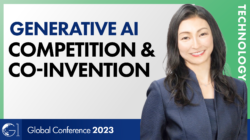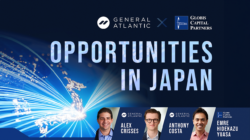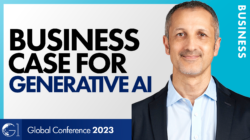Leading High Performing Remote Teams
How can leaders ensure that performance remains high in remote or hybrid-work environments?
Content Marketing
In this course, you’ll learn how compelling blogs, videos, podcasts, and other media can reach customers and drive sales. You’ll also learn steps for creating an effective content marketing plan, and some important ways to measure its impact and success.
Content marketing is a essential digital marketing strategy for companies looking to provide relevant and useful information to support your community and attract new customers.
Get started on your content marketing journey today.
Sustainable Innovation in Times of Disruption: Choices for a Better Society
There are opportunities for progress all around us. The key is to innovate on these opportunities sustainably.
To help identify most effective path forward, you'll need to gain a global perspective to these challenges in an open discussion. How can Japan and the world take action to create a more sustainable, innovative world? Where do you fit in?
It's time to find out.
Social Media & Digital Communications: Impact on Global Public Opinion
Social and digital media have dominated the communications industry for decades. But it's no secret that social media has the power to sway public opinion, and the way in which many companies use these platforms could be seen as manipulative.
What do companies need to be aware of when utilizing social and digital media? How can these mediums be used to better communicate strategically with the world?
Discover what top media and communications experts have to say.
CAGE Distance Framework
Want to expand overseas? The CAGE distance framework can help ensure you're constructing a solid global strategy in four areas: cultural, administrative, economic, and geographic. Learn how to leverage useful differences between countries, identify potential obstacles, and achieve global business success.
Servant Leadership
There's more to leadership than driving a team to profit. In fact, there's a word for looking beyond self-interest to prioritize individual growth: servant leadership. Try this course for a quick breakdown of what that is, how it works, and how it can lead to organizational success.
Strategy: Creating Value Inside Your Company
Have you ever wondered why certain companies are more successful than others? The answer is strategy: internal processes that control costs, allocate resources, and create value. This course from GLOBIS Unlimited can give you the tools you need for that strategic edge.
Strategy: Understanding the External Environment
To plan strategy on any level, you need to understand your company's external environment. In fact, your level of understanding can impact hiring, budgeting, marketing, or nearly any other part of the business world. Want to learn how to do all that? This course from GLOBIS Unlimited is the perfect first step!
Using Japanese Values to Thrive in Global Business
Japanese companies have unique cultural, communication, and operational challenges. But they also have values that have led to remarkable longevity. Check out this seminar to hear how these values help earn trust from overseas head offices and develop employees.
Marketing: Reaching Your Target
Every company works hard to get its products into the hands of customers. Are you doing everything you can to compete? In this course, you’ll find a winning formula to turn a product idea into real sales. Follow along through the fundamentals of the marketing mix and see how companies successfully bring products to market.
Basic Accounting: Financial Analysis
Want to compare your performance vs. a competitor? Or evaluate a potential vendor? Then you'll need to conduct a financial analysis. This course will teach you how to use three financial statements and evaluate financial performance in terms of profitability, efficiency, soundness, growth, and overall strength.
Career Anchors
What drives you to be good at your job?
Career anchors are based on your values, desires, motivations, and abilities. They are the immovable parts of your professional self-image that guide you throughout your career journey.
Try this short GLOBIS Unlimited course to identify which of the eight career anchors is yours!
Leadership with Passion through Kokorozashi
The key ingredient to success? Passion.
Finding your kokorozashi will unify your passions and skills to create positive change in society. This GLOBIS Unlimited course will help you develop the values and lifelong goals you need to become a strong, passion-driven leader.
Most companies today recognize the value of adopting sustainable business practices. That said, going green and embracing a social business model is often easier said than done. Depending on your current model or budget, setting impactful sustainability goals may not seem feasible.
But actually, it is.
The belief that companies have to choose between corporate social responsibility or profitability is quickly being debunked as more and more social businesses find their way onto the Fortune 500. Robin Lewis, cofounder of mymizu, discusses what it means to be a social business and how any company can contribute to a more sustainable future.
Next Article
3 Lessons from mymizu for Launching Your Social Enterprise
Transcript:
What is a social business?
Robin Lewis:
A social business is a business that integrates both business practices and principles with the compassion and passion required to create a more fair and just world. It’s kind of like combining the business acumen and the business savvy of a CEO with the passion and the compassion of an activist.
And when you combine those two things, that’s when we get real magic.
Can social responsibility be profitable?
Lewis:
There are a lot of major companies out there who are doing really positive things for the environment and for society at large. Just one example would be Tesla.
Tesla’s mission statement is to accelerate the transition to a sustainable future. And they’re currently valued at over a trillion dollars. While there are many companies who are having a net negative impact, who are up there in terms of the Fortune 500, there are also many companies who are doing incredible things and who are continuing to grow into this new economy that we’re building.
Next Article
Creating Shared Value and the Power of SDGs
WE HAVE A DREAM: A Storybook of SDGs and Subjective Truth
Can any business become sustainable?
Lewis:
So one of my favorite sayings in Japanese is pinchi wo chansu ni. You see a problem and you turn it into an opportunity. And a lot of the conversations I hear right now about sustainability and sustainable development focus on the problem. “Ah, we have a lot of work to do. We have so many things to solve,” and so on, which is true.
But on the flip side, from a business perspective, this current time that we’re in, this unique moment in history where we’re facing really unprecedented problems, is also the biggest growth opportunity in human history in many ways. And that includes things like clean tech and green energy.
There are so many areas that are now booming where we can add value and we can contribute to what’s happening. There are ways to shift, and I’ll give you one example.
There was a famous company in Scandinavia—I won’t name the company, but they were originally one of the biggest oil producers in the region. And they shifted completely to one of the biggest wind energy companies in the world. And it’s the same. You have the same expertise. Of course, there was a lot of transition during that time, but suddenly you’ve gone from a business that focuses on oil to a business that completely transitioned to furthering the green transition.
So there are many exciting examples of these kinds of things happening. And so it’s all about finding the opportunity in what is a relatively difficult situation for many.
What’s the first step towards sustainability?
Lewis:
You empathize.
Step one is to empathize with your people. To empathize with your customer, and so on. And when we’re talking about organizational change, I fundamentally believe that we need to listen, and we need to get the insights and the opinions of our team members.
So if there is one clear social issue that is on the top priority level for all of the team members—let’s say it’s about diversity and inclusion, let’s say it’s about people with disabilities, and so on—then we should start from the ones that matter most to the people in our team.
Try and gather their insights. Try and find commonalities. And then come up with an action plan.





